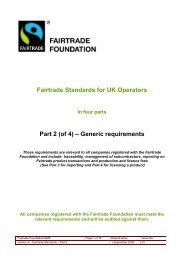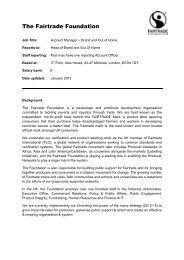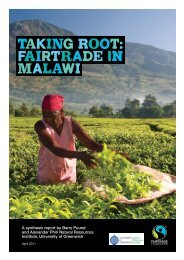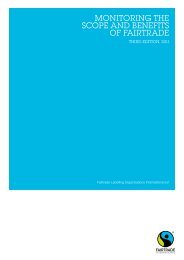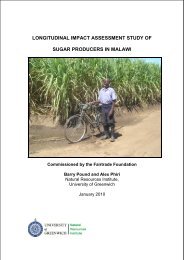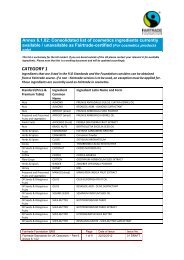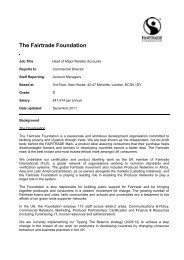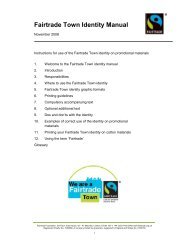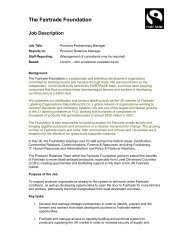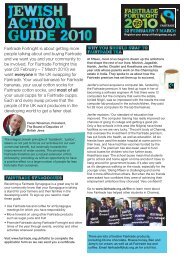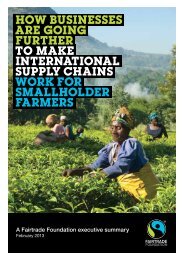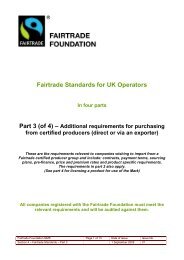Fairtrade and Coffee Report 2012 - The Fairtrade Foundation
Fairtrade and Coffee Report 2012 - The Fairtrade Foundation
Fairtrade and Coffee Report 2012 - The Fairtrade Foundation
Create successful ePaper yourself
Turn your PDF publications into a flip-book with our unique Google optimized e-Paper software.
2. CHALLENGING TIMES FOR THE<br />
<strong>Coffee</strong> sector<br />
<strong>The</strong> global coffee sector faces many challenges in the next decade including the continued global economic crisis,<br />
volatile coffee prices, shortages of coffee supply in key origins, rising production costs, reduced availability of l<strong>and</strong><br />
<strong>and</strong> labour, food security <strong>and</strong> poverty in coffee communities, <strong>and</strong> the impacts of climate change.<br />
2.1. Background <strong>and</strong> recent developments<br />
Economic importance<br />
In 2011, an estimated 6.24 million tonnes of coffee<br />
were exported, worth $23.5bn. Although this only<br />
represented a 7 per cent increase in volume from 5.8m<br />
tonnes in 2010, the value increased by 40 per cent,<br />
from $16.7bn, as a result of prevailing high prices.<br />
<strong>Coffee</strong> provides a livelihood for 125 million people<br />
around the world, 8 generating cash returns in<br />
subsistence economies <strong>and</strong>, providing much-needed<br />
rural employment for both men <strong>and</strong> women in the<br />
labour-intensive production <strong>and</strong> harvesting processes.<br />
For many countries, coffee exports generate a<br />
significant proportion of national tax income <strong>and</strong><br />
gross domestic product <strong>and</strong> are a vital source of the<br />
foreign exchange earnings governments rely on to<br />
improve health, education, infrastructure <strong>and</strong> other<br />
social services. Burundi relies on coffee for 60 per<br />
cent of its export earnings, Honduras for a quarter,<br />
Nicaragua for nearly a fifth. 9 In Ethiopia, 15 million<br />
smallholders, nearly a fifth of the population, depend<br />
on coffee for their livelihood – high global commodity<br />
prices contributed to record coffee exports in 2010/11<br />
which accounted for 30 per cent of the country’s<br />
total export earnings. 10 In Ug<strong>and</strong>a, half a million<br />
smallholders produce coffee, the primary source of<br />
income for around 2.5 million people or 8 per cent of<br />
the population. 11<br />
Liberalisation of the coffee sector<br />
From the 1960s until 1989, the coffee market was kept<br />
in reasonable balance of supply <strong>and</strong> dem<strong>and</strong> in part<br />
due to the 1962 International <strong>Coffee</strong> Agreement (ICA)<br />
<strong>and</strong> subsequent agreements, signed by governments<br />
of producing <strong>and</strong> consuming countries. <strong>The</strong> ICA<br />
regulated much of global coffee trade through a system<br />
of export quotas <strong>and</strong> buffer stocks which largely<br />
maintained stable <strong>and</strong> remunerative prices to growers.<br />
<strong>The</strong> economic clauses of the ICA were suspended in<br />
8 ICO, FAQs, www.ico.org<br />
9 ICO, About <strong>Coffee</strong>/World <strong>Coffee</strong> Trade, www.ico.org<br />
10 Reuters Africa, Ethiopia coffee exports hit record high, 27 July 2011.<br />
2010/11 coffee exports earned a record $841.6m, nearly 30% of the<br />
estimated $3bn total export earnings<br />
11 Gerrit Ribbink et al, Successful supply chains in Ug<strong>and</strong>a: A study of<br />
three successful chains in the coffee, dried fruit <strong>and</strong> fresh vegetables<br />
sectors, May 2005, p. 23<br />
1989 because of abuse of the quota system <strong>and</strong> their<br />
incompatibility with prevalent free market economic<br />
policies. Controversial IMF <strong>and</strong> World Bank structural<br />
adjustment programmes (SAP) required governments<br />
of producing countries to privatise state-controlled<br />
industries such as the coffee sector <strong>and</strong> open them to<br />
competition from private traders ostensibly to improve<br />
efficiency. As a consequence, world coffee prices<br />
immediately dropped by half to less than 80 cents a<br />
pound. <strong>The</strong>y remained low for five years until frost hit<br />
production in Brazil in 1994 <strong>and</strong> prices briefly surged<br />
above 200 cents. Three years later, prices rocketed<br />
to 270 cents a pound driven by strong dem<strong>and</strong>, tight<br />
supply <strong>and</strong> low stocks, fuelled by intense speculator<br />
activity.<br />
<strong>Coffee</strong> crisis 1999-2004<br />
<strong>The</strong> 1980s <strong>and</strong> 1990s saw huge production increases<br />
in Brazil <strong>and</strong> especially in Vietnam where government<br />
investment in expansion of the coffee export sector<br />
catapulted Vietnam from an insignificant producer<br />
to the world’s second largest producer after Brazil.<br />
<strong>The</strong> resulting oversupply of coffee heralded the<br />
coffee crisis of 1999 to 2004. As Figure 5 below<br />
shows, this disastrous period saw the price of arabica<br />
plummet to a 30-year low of 45 cents a pound in<br />
2001 with devastating social, economic <strong>and</strong> political<br />
consequences for countries throughout Africa, Asia<br />
<strong>and</strong> Latin America. Export earnings fell from around<br />
$10bn to $6bn 12 , reducing rural incomes <strong>and</strong> trapping<br />
coffee farmers <strong>and</strong> their families in chronic poverty.<br />
Hundreds of thous<strong>and</strong>s of coffee farmers were forced<br />
out of business, many ab<strong>and</strong>oning their farms in<br />
search of work in cities or migrating to neighbouring<br />
countries, along with thous<strong>and</strong>s of l<strong>and</strong>less<br />
plantation workers.<br />
12 Oxfam, Mugged: Poverty in your coffee cup, 2002, p. 20; World<br />
Bank, World development report 2008, 2007, p. 136<br />
6 <strong>Fairtrade</strong> <strong>and</strong> <strong>Coffee</strong>



